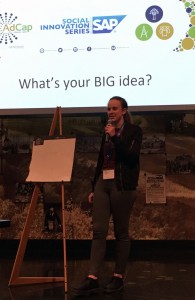October 5, 2016
“Instead of asking children what they want to be when they grow up, we should instead ask them what problem do they want to solve,” said Jaime Casap, chief educational evangelist at Google. According to Casap, most jobs of the future haven’t been defined yet. Instead of preparing students to enter today’s workforce, we should foster a mindset that empowers students for success in a rapidly dynamic, global society.
they grow up, we should instead ask them what problem do they want to solve,” said Jaime Casap, chief educational evangelist at Google. According to Casap, most jobs of the future haven’t been defined yet. Instead of preparing students to enter today’s workforce, we should foster a mindset that empowers students for success in a rapidly dynamic, global society.
Author Ken Bain, in his book, “What the Best College Students Do” draws a distinction between “strategic” learners and “deep” learners. Strategic learners are driven by external rewards, such as grades and honors. They often have superficial understanding of their disciplines and are rarely able to transfer that learning. Conversely, according to Bain, deep learners are driven by their own curiosity and sense of wonder. They conceive of their own education as a great adventure. They are reflective, self-directed, and autonomous. They are resilient and embrace failure. They see themselves as part of a broader learning community, and they find perspective, support, and inspiration from that community. In the long term, they are more successful—and happier.
One of Bain’s core findings is that these mindsets—beliefs that can change through practice, a sense of belonging, and a reflective self-awareness—are the foundation on which all learning rests. The distinctive MPA mindset is one that marries critical thinking and deep content knowledge and results in a base for growing essential skills in collaboration, problem solving, perseverance, and creativity. In the MPA mindset, students are challenged to apply their understanding to stir the human spirit, stand for justice, and shake the world. This is what we call rigor with purpose.
Erica Brewinski, Middle School director, accompanied five MPA students this week to the SAP Social Innovation Series at the University of Minnesota. The day was one of six events nationally sponsored by SAP in partnership with the GENYOUth Foundation. The program, AdVenture Capital (AdCap), is designed to inspire, empower, and motivate creative, curious, and brave student entrepreneurs who wish to make changes in school and community health and wellness.
It was a full-day workshop that used the design thinking process to teach kids about social entrepreneurship. Each student identified a problem at their school related to health and wellness and then developed an idea to combat this issue. They then had to give a one-minute “pitch” in front of a panel of judges and a large audience, and then answer questions for another minute. Senior Maija Olson’s idea was one of only 10 chosen to receive a $1000 grant to implement.
Reflecting on the experience and her success, Maija had this to say, “I believe Mounds Park Academy helped prepare me for this. My experiences in speech and debate helped to share my plan in a convincing and professional way. MPA has inspired me to think creatively and strive to solve problems I see in my community and I am excited to give back with this grant.”
Clearly, Maija Olson is an incredible person in her own right. At the same time, I would like to think that MPA has awakened and empowered her own mindset of a deep learner. In the end, mindsets are what remains once we have forgotten most of what we have learned in school, and they shape our approach to all further endeavors.
Do you have friends, family, or colleagues whose children would benefit from the distinctive MPA mindset? Please consider inviting them to the first MPA Admission Open House of the year on Sunday, October 16. Find more details here.